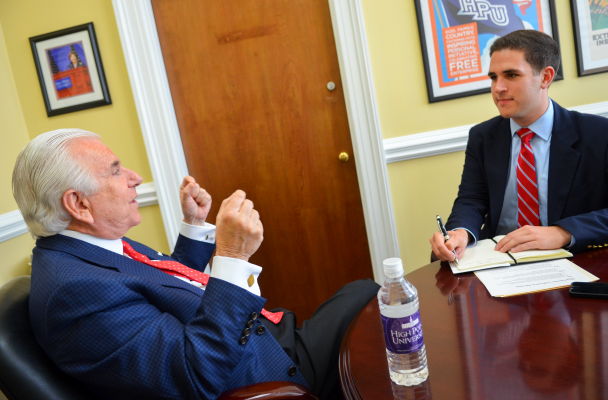EIC’s last interview: Q&A with Dr. Nido Qubein

Dr. Nido Qubein and James Ensor sat down for Ensor’s last interview as the Editor in Chief of the Campus Chronicle. Photo submitted.
By James Ensor// Editor-in-Chief
Campus Chronicle Editor in Chief James Ensor has served on the Chronicle’s staff throughout his four years at High Point University. During that time, Ensor has been able to interview some of the world’s most brilliant minds such as Steve Wozniak, co-founder of Apple, and Biz Stone, co-founder of Twitter, as they have visited the HPU campus. For his last interview as Editor in Chief, Ensor decided to sit down with Dr. Nido Qubein, HPU president, to discuss life and Qubein’s tenure as president.
Q: Tell me what the process has been like for you since becoming HPU’s president.
A: In many ways, I was made for this job – this is a people person job and I adore it. The story is well-known now that HPU has come a long way despite the economic disruption of 2008. We have exercised faithful courage on this journey as we have defined a clear vision, designed a solid strategy, implemented a practical system, and have had consistent execution. We continued to move onward and upward throughout the process.
Q: Have you taken a lot of risks as president?
A: HPU is a complex organism. We’ve taken some calculated risks here and they have all worked. Along the way we’ve had some minor things not work, but we’ve realigned and fixed them. Overall, we have been so blessed in the application of our ideas.
Q: What’s it like being president of an ever-changing institution?
A: Imagine how complicated it is to administer a school daily while you’re acquiring land, while you are designing and building buildings, while you are managing your cash flow, while you are attracting students and while you are accommodating those students. It’s very complex. The trick is, I love what I do.
Q: After serving HPU for nearly 12 years, are you feeling “burned out?”
A: In many ways, God prepared me for this work. One person cannot build a university – it takes a village to do it. It has been a wonderful journey and I can’t wait to come to work each day.
Q: What has been your biggest failure as president?
A: Early on when I came to HPU, I did not do a very good job at articulating to the citizens of High Point about our future plans and how we planned on expanding. We had no land, but we were growing the number of students. I did not look beyond us enough to think about the citizens and how they were responding to our growth. At the end of the day, I was responsible for not articulating our vision to the larger community. The city of High Point has been forgiving and have embraced what we have done since then.
Q: What are your future goals for HPU?
A: We want to expand our graduate school. Your most important focus should always been on education. Enhancing the honors program, first year experience, and the Quality Enhancement Plan (QEP) are all major goals we have. These are constant goals that we will always be working towards. In terms of expansion, we are not looking to expand too much more. We want to remain a school that meets the needs of our students.
Q: How does one find happiness?
A: If you know your purpose in life, then you will have passion. If you have passion in your life, you will have energy. If you have energy, you will produce action. If you produce action, it leads to success. And if you have success, you are much more likely to lead a life of significance. If you lead a life of significance, it will lead to fulfillment. If you have fulfilment in your life, you will have happiness.
Q: What is some advice you would give myself and my fellow graduates as we enter life beyond HPU?
A: Thee things. One – focus is more important than intelligence. The likelihood of a focused person succeeding is greater than the likelihood of an intelligent person who chooses not to focus. Two – follow your heart. It sounds impractical, but it isn’t. Do what you believe in. Care about what you are doing. Three – acknowledge that your choices will determine who you become. Choose well. For example, choose the art of the possible. Choose language that is positive. Choose to take responsibility for your actions.